A Forum Exploring the Interplay Between Intellectual Property Rights and Human Rights
In celebration of National Intellectual Property Rights Month, the University of the Philippines Law Center Institute of Human Rights (UP IHR), in partnership with the UP College of Law Intellectual Property and Human Rights (Law 194-A) class, hosted an insightful and dynamic online forum titled “A Forum Exploring the Interplay Between Intellectual Property Rights and Human Rights.” on April 30, 2025. The event was attended by over 140 participants, including students, human rights advocates, government officials, and legal professionals.
The forum served as a crucial platform for discussing the intricate relationship between intellectual property (IP) and human rights, shedding light on how IP laws are not just economic tools but also have significant implications for human dignity, healthcare access, cultural preservation, and scientific progress.
Opening Remarks and Keynote Addresses
UP College of Law Dean Darlene Marie B. Berberabe opened the event by delivering the welcome remarks where she praised the students’ initiative in addressing the complex, evolving issues of intellectual property law and its potential to make the legal framework more inclusive. She acknowledged the difficulties in balancing IP protections and the social obligations inherent in human rights, and emphasized the need to engage deeply with ethical questions regarding the economic value of creativity and the moral considerations that should accompany the protection of ideas.
Professor Elizabeth H. Aguiling-Pangalangan, the Director of UP IHR and the Philippine Representative to the ASEAN Commission on the Promotion and Protection of the Rights of Women and Children (ACWC), opened the discussions by addressing the human right to science—an essential facet of the Universal Declaration of Human Rights (UDHR). Professor Aguiling-Pangalangan pointed out that the right to science is not just about access to scientific knowledge but also includes the equitable enjoyment of scientific advancements and their applications. This right is often undermined by IP laws that overly prioritize commercial interests over the public good, particularly in sectors like healthcare and agriculture.
In her keynote message, Atty. Brigitte M. Da Costa-Villaluz, Director-General of the Intellectual Property Office of the Philippines, emphasized the importance of understanding the intersection of IP and human rights as a critical field for future law and policy development. She noted the difficulties in balancing the protection of intellectual property with human rights obligations, but also underscored the need for immersion and collaboration between policy-makers, IP professionals, and human rights advocates in finding sustainable solutions.
Presentations and Discussions
The forum featured eight law students—Kristine Relampagos, Lizzet Ruiz, Johann Franz Yngson, Allyson Lorraine Arceo, Katya Sofia Maxine Gomez, Rodrigo Juan Rafael Silverio, Joseph Christian Bautista, and Dominique Cadiz—presenting their research as part of their Law 194-A course requirements. These student-led presentations explored the ethical implications of patenting plants and the impact of patenting on food security. They also examined the protection of Indigenous Peoples’ intellectual property rights in relation to genetic resources and traditional knowledge, particularly in the context of biopiracy. Additionally, the students delved into the legal complexities surrounding AI trade secrets in national defense contracts, as well as the tensions between copyright law and human rights, especially in the areas of data mining and AI training. Other topics included the commodification of identity and the challenges of protecting personal autonomy under current intellectual property laws, the preservation of media and cultural works, and the guidelines for upcycling practices under Philippine trademark law.
Legal Frameworks and International Instruments
The forum also delved into the legal frameworks surrounding intellectual property and human rights. Prof. Josephine R. Santiago, professor of the Law 194-A Class, addressed the Agreement on Trade-Related Aspects of Intellectual Property Rights (TRIPS Agreement) and its implications for developing countries that struggle to balance IP enforcement with human rights protections. She discussed how the Philippine Intellectual Property Code (Republic Act 8293), though progressive, still faces challenges in effectively integrating human rights principles into the IP system.
Additionally, Prof. Santiago highlighted the importance of international agreements, such as the Nagoya Protocol, which addresses the access and benefit-sharing of genetic resources and traditional knowledge. The role of international bodies like the World Intellectual Property Organization (WIPO) was also discussed, with Professor Aguiling-Pangalangan drawing attention to the inadequacies of these frameworks in effectively addressing biopiracy.
Open Forum and Reactions
Dr. Ana Maria Theresa P. Labrador, Atty. Senando Angelo R. Santiago, and Prof. Josephine R. Santiago provided their reactions to the presentations, particularly focusing on the need for better protection of indigenous knowledge. They expressed concerns over the increased exploitation of marginalized communities and emphasized the lack of effective legal remedies to prevent biopiracy. Their reactions underscored the necessity for collaborative international efforts and the implementation of more robust safeguards for indigenous peoples.
The open forum, moderated by Atty. James Gregory A. Villasis, allowed the participants to discuss policy gaps and legal reforms to ensure that intellectual property laws protect both the creators and the public interest. Research Assistants Jamelle Reneé D. Leviste and Veronica Danielle A. Florendo facilitated the webinar, ensuring smooth interaction and engagement with the participants.

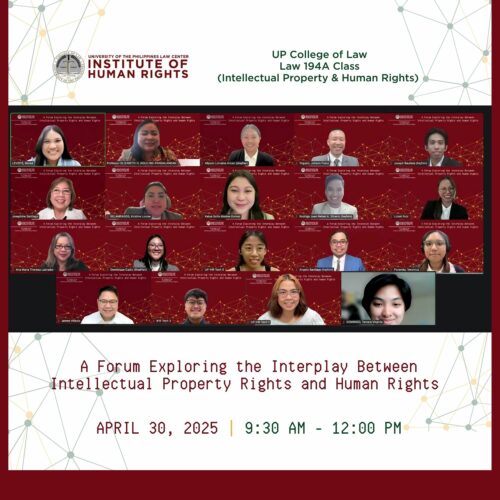
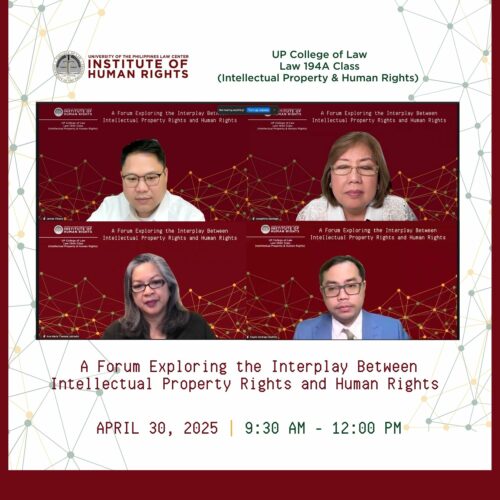
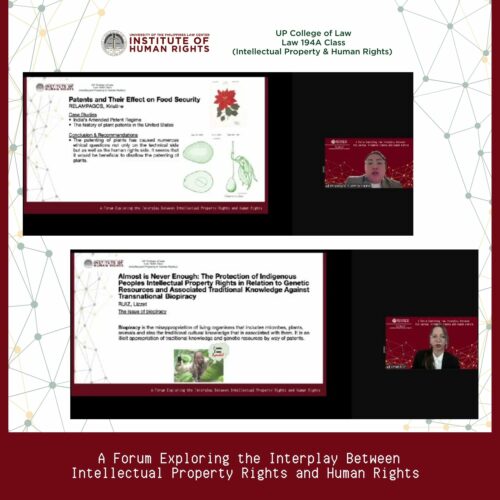
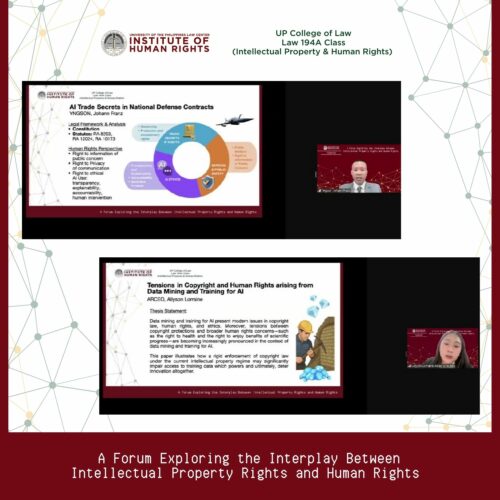
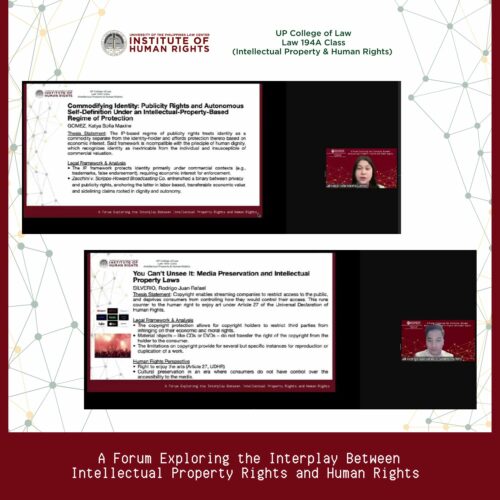
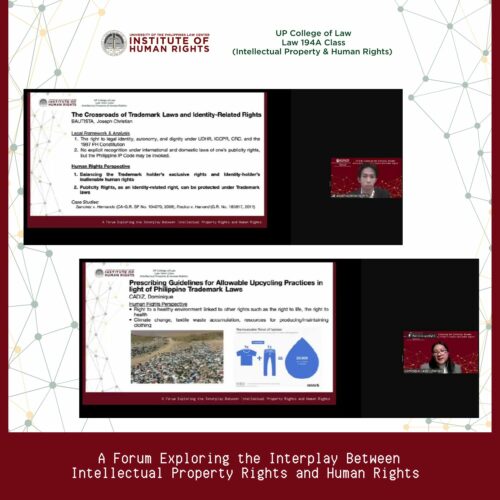






































































































 on the upper right corner to select a video.
on the upper right corner to select a video.